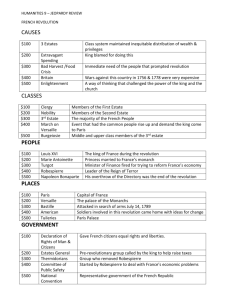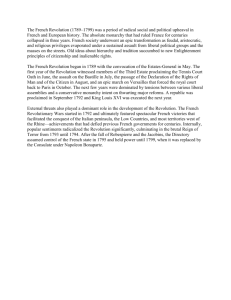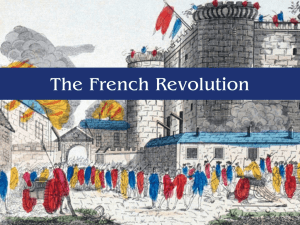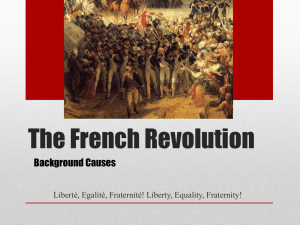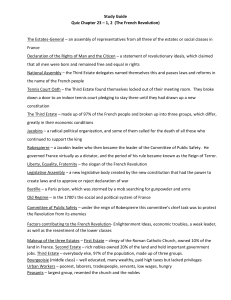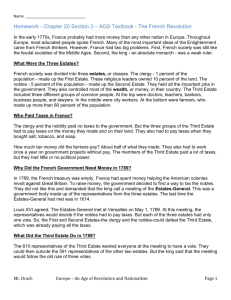Lecture 11 - Mendham Borough School District
advertisement
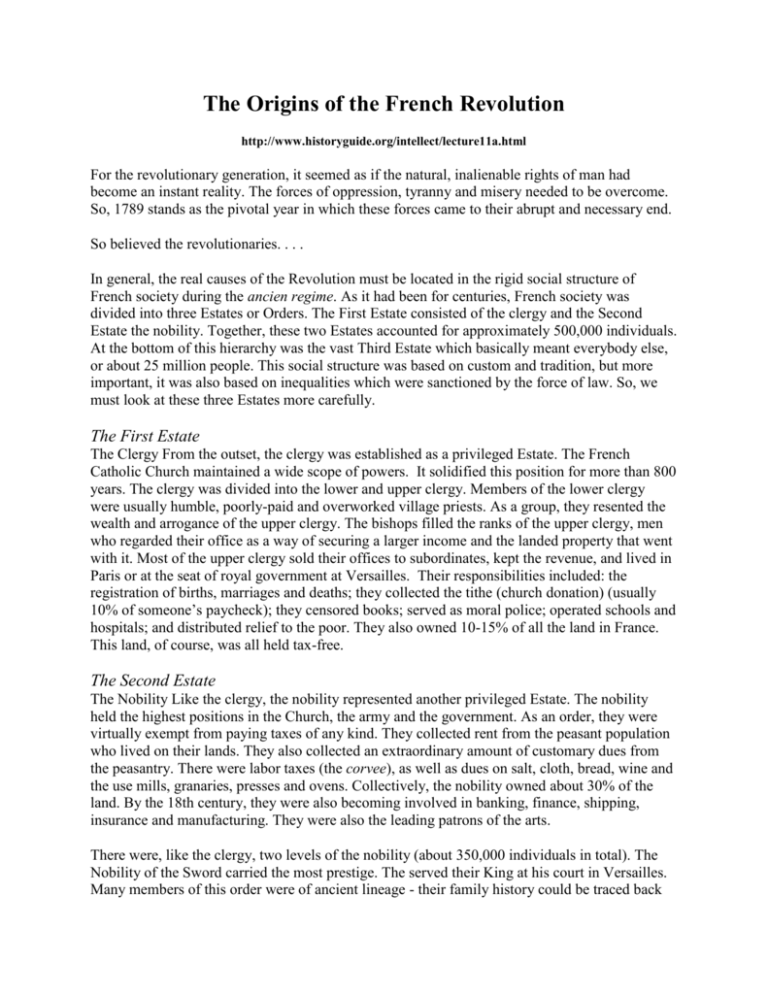
The Origins of the French Revolution http://www.historyguide.org/intellect/lecture11a.html For the revolutionary generation, it seemed as if the natural, inalienable rights of man had become an instant reality. The forces of oppression, tyranny and misery needed to be overcome. So, 1789 stands as the pivotal year in which these forces came to their abrupt and necessary end. So believed the revolutionaries. . . . In general, the real causes of the Revolution must be located in the rigid social structure of French society during the ancien regime. As it had been for centuries, French society was divided into three Estates or Orders. The First Estate consisted of the clergy and the Second Estate the nobility. Together, these two Estates accounted for approximately 500,000 individuals. At the bottom of this hierarchy was the vast Third Estate which basically meant everybody else, or about 25 million people. This social structure was based on custom and tradition, but more important, it was also based on inequalities which were sanctioned by the force of law. So, we must look at these three Estates more carefully. The First Estate The Clergy From the outset, the clergy was established as a privileged Estate. The French Catholic Church maintained a wide scope of powers. It solidified this position for more than 800 years. The clergy was divided into the lower and upper clergy. Members of the lower clergy were usually humble, poorly-paid and overworked village priests. As a group, they resented the wealth and arrogance of the upper clergy. The bishops filled the ranks of the upper clergy, men who regarded their office as a way of securing a larger income and the landed property that went with it. Most of the upper clergy sold their offices to subordinates, kept the revenue, and lived in Paris or at the seat of royal government at Versailles. Their responsibilities included: the registration of births, marriages and deaths; they collected the tithe (church donation) (usually 10% of someone’s paycheck); they censored books; served as moral police; operated schools and hospitals; and distributed relief to the poor. They also owned 10-15% of all the land in France. This land, of course, was all held tax-free. The Second Estate The Nobility Like the clergy, the nobility represented another privileged Estate. The nobility held the highest positions in the Church, the army and the government. As an order, they were virtually exempt from paying taxes of any kind. They collected rent from the peasant population who lived on their lands. They also collected an extraordinary amount of customary dues from the peasantry. There were labor taxes (the corvee), as well as dues on salt, cloth, bread, wine and the use mills, granaries, presses and ovens. Collectively, the nobility owned about 30% of the land. By the 18th century, they were also becoming involved in banking, finance, shipping, insurance and manufacturing. They were also the leading patrons of the arts. There were, like the clergy, two levels of the nobility (about 350,000 individuals in total). The Nobility of the Sword carried the most prestige. The served their King at his court in Versailles. Many members of this order were of ancient lineage - their family history could be traced back hundreds of years. But there were also members of this estate who were relative newcomers. The Nobility of the Robe also had prestige but much less than did the Nobility of the Sword. Numerous members of the Nobility of the Robe had been created by the monarchy in the past. French kings needed money so it seemed logical to offer position and status to those men who were willing to pay enough money for it. But more important, perhaps, was that by giving these men royal positions, the king could keep an eye on their behavior. In many ways, this is one reason why Louis XIV built Versailles in the first place. Originally a vast hunting lodge, Louis built up Versailles in order to house his generals, ministers and other court suck-ups. Some of the lesser nobility were partial to the philosophes (philosophers) of the Enlightenment and during the early days of the Revolution would be considered "liberal nobles." They wished to see an end to royal power but not necessarily the end of the monarchy. These liberal nobles tended to look to France's traditional enemy, England, as a model for what France ought to become, a limited or constitutional monarchy. The Third Estate This estate ostensibly consisted of every one who was not a member of either the First or Second Estates. Totaling approximately 25 million souls, the Third Estate was composed of the bourgeoisie, the peasantry and the urban artisans. As a class, the bourgeoisie - merchants, manufacturers, bankers, doctors, lawyers, intellectuals - had wealth. In some cases, enormous wealth. By 1789, the bourgeoisie had numerous issues they wished addressed. They wanted all Church, army and government positions open to men of talent and merit. They sought a Parliament that would make all the laws for the nation. They desired a constitution that would limit the king's powers. They also desired fair trials, religious toleration and vast administrative reforms. These are all liberal ideas that would certainly emerge after the summer of 1789. The peasantry consisted of at least twenty-one million individuals during the 18th century. Their standard of living was perhaps better than the European peasantry in general. However, the French peasant continued to live in utmost poverty. Collectively, the peasantry owned 30-40% of the available land but mostly in small, semi-feudal plots. Most peasants did not own their land but rented it from those peasants who were wealthier or from the nobility. They tried to supplement their income by hiring themselves out as day laborers, textile workers or manual laborers. Peasants were victimized by heavy taxation - taxes were necessary to pay for the costs of war, something that had already consumed the French government for an entire century. So, the peasants paid taxes to the king, taxes to the church, taxes and dues to the lord of the manor, as well as numerous indirect taxes on wine, salt, and bread. Furthermore, the peasants also owed their lord a labor obligation. And throughout the 18th century, the price of rent was always increasing, as did the duties levied on goods sold in markets and fairs. By 1789, the plight of the French peasant was obvious. Taxes were increased as was rent. Peasants continued to use antiquated methods of agriculture. The price of bread soared and overall, prices continued to rise at a quicker rate than wages. To make matters worse, there was the poor harvest of 1788/89. The urban workers or artisans, as a group, consisted of all journeymen, factory workers and wage earners. The urban poor also lived in poverty, a poverty that was intensified by 1789. By that time, wages had increased by 22% while the cost of living increased 62%. These, then, are the social causes that acted as a breeding ground for the grievances and passions the Revolution would unleash. Royal Absolutism Eighteenth century France was, in theory, an absolute monarchy. By the early 18th century, French kings had nearly succeeded in wresting all power from the nobility. Thanks in part to the effort of Louis XIV, absolute monarchy was, in both theory and practice, a reality. France had no Parliament. France did have an Estates General which was a semi-representative institution in that it was composed of representatives from each of the Three Estates. The last time the Estates General had been convened was in 1614! Was the Estates General a truly representative body? Hardly. The way the French administered the country was through a bloated bureaucracy of officials. By 1750, the bureaucracy had overgrown itself - it was large, corrupt and inefficient. Too many officials had bought and sold their offices over the years. France had no single, unified system of law. Law There were thirteen distinct regions in France before 1789 and each was under the jurisdiction of a Parlement. Each Parlement contained between fifty and 130 members. They were the local judges and legal elites. They tried cases for theft, murder, forgery, sedition and libel. They also served as public censors and sometimes were responsible for fixing the price of bread. They were hated by almost everyone, including the king. Of course, the king also had his royal lackeys, the intendents. The intendents were even more hated than the Parlement. Created to help curb the power of the nobility, the intendents became known for their habit of random taxation and arrest of the peasantry. Such a situation made for the inefficient operation of Europe's largest and strongest country. Finances By 1789, France was bankrupt. The country could no longer pay its debts, debts that were all the result of war. One example says a great deal about this situation. By 1789, France was still paying off debts incurred by the wars of Louis XIV, that is, wars of the late 17th and early 18th century. Furthermore, a number of social groups and institutions did not pay taxes of any kind. Many universities were exempt from taxation as were the thirteen Parlements, cites like Paris, the Church and the clergy, the aristocracy and numerous members of the bourgeoisie. And of course, it was simply brilliant planning to continue to tax the peasants - peasants who, having nothing to contribute were, over the course of the century, forced to contribute even more. The Enlightenment The effect of the Enlightenment on the French Revolution has created a debate which will not soon be resolved. But, in general, it can be said that there is no causal relationship between the philosophes of the Enlightenment and the outbreak of the French Revolution. Few philosophes, if any, advocated revolution and the reason is fairly clear. No philosophe advocated the violent overthrow of the existing order of things because violence was contrary to human reason. But because the philosophes of the Enlightenment attacked the established order together with authority of any kind, their ideas helped to produce what can only be called a revolutionary mentality. One modern historian has correctly observed that: 18th century philosophy taught the Frenchman to find his condition wretched, unjust and illogical and made him disinclined to the patient resignation to his troubles that had long characterized his ancestors . . . . The propaganda of the philosophes perhaps more than any other factor accounted for the fulfillment of the preliminary condition of the French Revolution, namely discontent with the existing state of things. (Henri Peyre, "The Influence of Eighteenth Century Ideas on the French Revolution," Journal of the History of Ideas vol. 10, No. 1 (January 1949). The philosophes advocated the use of Reason in all human affairs. They knew that Reason, together with its sister, criticism, could effect change: a change in morals, a change in human knowledge, a change in human happiness. The American Revolution Lastly, there is little doubt that the American Revolution of the 1770s and the formation of a republic in the 1780s served as a profound example to all European observers. Hundreds of books, pamphlets and public lectures analyzed, romanticized and criticized the American rebellion against Great Britain. For instance, in 1783 the Venetian ambassador to Paris wrote that "it is reasonable to expect that, with the favorable effects of time, and of European arts and sciences, [America] will become the most formidable power in the world." American independence fired the imagination of aristocrats who were unsure of their status while at the same time giving the promise of ever greater equality to the common man. The Enlightenment preached the steady and inevitable progress of man's moral and intellectual nature. The American example served as a great lesson - tyranny could be challenged. Man did have inalienable rights. New governments could be constructed. The American example shed a brilliant light. As one French observer remarked in 1789, "This vast continent which the seas surround will soon change Europe and the universe." The thirteen colonies began with a defensive revolution against tyrannical oppression and they were victorious. The Americans showed how rational men could assemble together to exercise control over their own lives by choosing their own form of government, a government sanctified by the force of a written constitution. With this in mind, liberty, equality, private property and representative government began to make more sense to European observers. If anything, the American Revolution gave proof to that great Enlightenment idea - the idea that a better world was possible if it was created by men using Reason. French Revolution http://school.eb.com/comptons/print?articleId=274436&fullArticle=true&tocId=201198 The French people overthrew their ancient government in 1789. They took as their slogan the famous phrase “Liberté, Égalité, Fraternité”—Liberty, Equality, Fraternity. Equality, or doing away with privilege, was the most important part of the slogan to the French revolutionists. They did win equality before the law. Why the French Wanted Equality The French had good reasons for wanting equality. Before 1789 inequality was typical of the old government. The nobles and clergy were the privileged orders. They were exempt from such direct taxes as the taille, or land tax. Most taxes were paid by the Third Estate—a class that included peasants, artisans, merchants, and professional men. Even among these groups taxes were not equal. Some provinces were exempt from certain assessments, such as the gabelle, or salt tax. In addition, the collection of some taxes was made by contractors or tax farmers, and the tax gatherers collected whatever they could. Other Inequalities There were social and economic inequalities as well as political ones. The peasant suffered under the burden of out-of-date feudal dues. These were collected with renewed vigor by the nobles in the latter part of the 18th century. Rabbits might destroy the peasant's garden and pigeons eat his grain, but he must not kill them. They were protected for the lord's hunting. The peasant's fences were broken down and his crops trampled in the chase, but he could claim no damages. In addition to the dues to the king and the nobles, the peasants had to pay dues to the church. These and other obligations seemed senseless and unreasonable in an age when people were coming to believe in the rule of reason. The conditions were no worse in the latter part of the 18th century than they had been earlier. Neither were they as bad in France as in some other parts of Europe. Now, however, the people were beginning to think. The writers of the time helped stir up thought and discontent. Final Steps Before the Revolution At last the day of reckoning came. The national treasury had been exhausted by the wars of Louis XIV and by his extravagance and that of his successors. The 250 million dollars that it cost France to aid the Americans in their fight for independence was the last straw. Jacques Turgot and Jacques Necker, ministers of finance, had tried to ward off bankruptcy by cutting court expenses. The reckless court, led by the sprightly, frivolous, extravagant queen, Marie Antoinette, would not listen to the word “economy.” Turgot and Necker were dismissed and other ministers took their place. Finally foreign bankers refused to lend more money. Public opinion was deeply stirred by the Parlement of Paris, a judicial body which defied the king and refused to enforce new taxes. In 1788 Louis XVI, as a last resort, called a meeting of the Estates-General. The three estates were the nobles, the clergy, and the common people. Their representatives met at Versailles, a suburb of Paris, early in May 1789. Reforms and a constitution were demanded at this meeting. The Revolution With the meeting of the Estates-General on May 5, 1789, the Revolution began. The representatives of the Third Estate led the way. Some of the nobles and many of the clergy joined with them. They changed the name of the gathering from Estates-General, which represented classes, to National Assembly, which represented the people of France. When the king shut them out from their usual place of meeting, they took the famous Oath of the Tennis Court (June 20, 1789), pledging themselves not to separate until they had given France a constitution. When the king sent a messenger to remove them from their hall, the fiery Mirabeau cried out: “Go tell your master that we are here by the will of the people, and that we shall be removed only at the point of the bayonet.” Paris, 11 miles away, was alarmed by rumors of the troops gathering about Versailles. A Paris mob stormed and captured the old royal prison in Paris, called the Bastille, on July 14. Here for generations kings and ministers had imprisoned men and women at will. Soon after, its thick walls were torn down. The date of its capture became a French national holiday. When the king was told what had taken place he exclaimed: “Why, this is a revolt!” “No, sire,” was the reply, “it is a revolution.” After the fall of the Bastille a revolutionary committee of middle-class citizens governed Paris. A national guard composed mainly of citizens was organized. It was commanded by General Lafayette. Then the provinces followed the lead of Paris and formed revolutionary governments. The peasants in many places burned the castles of the lords in order to destroy the papers which contained the records of the lords' manorial rights. There was anarchy in many country districts. Nobles Give Up Their “Privileges” A report of the peasant outbreaks made a strong impression on the Assembly. Some liberal nobles in that body set the example of giving up their feudal rights. Amid the wildest enthusiasm, men weeping and embracing each other, one noble after another gave up some exclusive privilege. Finally a decree was passed which aimed at abolishing the entire feudal system. That wild night of Aug. 4, 1789, marked the beginning of equality. Remnants of feudal dues, however, kept the peasants uneasy until 1793. Meanwhile work continued on the constitution which the Assembly had promised to prepare for France. It was finally finished in 1791. Nobility was abolished. France was made a limited monarchy, with a one-house legislature. The immortal part of the document was the Declaration of the Rights of Man. It included the following points: 1. All men were born free with equal rights. 2. All citizens have the right to take part in electing representatives to make the laws. 3. Every person shall be free to speak, write, or print his opinions provided he does not abuse this privilege. 4. The amount of taxes which a person is called upon to pay shall be based on the amount of wealth that he possesses. The Declaration of the Rights of Man came to be regarded as the charter of democracy. The equality of all men in the eyes of the law is its essence. Property was inviolable, for the chief supporters of the new order owned property or desired to own it. The King Wavers Louis XVI was a weak and indecisive king. At first he did promise to obey the constitution which had been instituted in 1791, though it placed a narrow limit on his power. Later, however, he listened to evil counselors and changed his mind. Many nobles had fled before the Revolution broke. These émigrés, as they were called, later headed by the king's own brothers, were in Germany, Austria, and Switzerland. They were appealing to the princes of Europe to stop the Revolution in France and threatening a reign of bloodshed when they returned. The people of France mistrusted the king and still more mistrusted Marie Antoinette, “the Austrian woman.” In October 1789 a mob had brought them— and the Assembly with them—from Versailles to Paris so that they might be more closely watched. Overthrow of the Monarchy In June 1791 the suspicions against Louis XVI and Marie Antoinette became certainties for most of the people when the king and queen, with their children, tried to escape. They were captured at Varennes, on the edge of the Argonne, before they reached the French border. They were brought back to Paris. From that day the monarchy was doomed. These events helped divide the revolutionists into two parties, the Constitutional Royalists and the Republicans. The new Legislative Assembly, which met as soon as the king had accepted the constitution (September 1791), still wanted to keep the monarchy. The Republican sentiment, however, increased rapidly as the king's weakness became more apparent. On Aug. 10, 1792, a mob invaded the Tuileries and killed the guards. The royal family sought refuge in the hall of the Legislative Assembly. On Sept. 21, 1792, a decree was passed that “royalty is abolished in France,” and a republic was proclaimed. Four months later Louis XVI was sent to the guillotine. This was a beheading machine named for the physician whose recommendation brought it into use. To guide the Revolution through this crisis, a strong government was needed. For this the people sacrificed liberty. A convention was called to draw up a new constitution, and for three years (1792–95) a committee of this assembly, the Committee of Public Safety, ruled France while the constitution was set aside. The power of this committee did not come from the Convention, but from the radical Jacobin Club. Its members in the Convention were known as the Mountain, from the high seats they occupied in the Legislative Assembly hall. The men in power were Georges-Jacques Danton, Jean-Paul Marat, and Maximilien Robespierre until Marat was assassinated by Charlotte Corday. Through agents and spies and “deputies on mission” the Committee spread its net over the whole country. It maintained its position by terror. Hence the period is known as the Reign of Terror. Royalist uprisings were sternly put down, and thousands were sent to the guillotine. Marie Antoinette, Madame Roland, aristocrats and tradesmen, atheists such as Jacques René Hébert, and even Danton (because he urged moderation) were executed, usually with a mock trial or none at all. Old institutions were changed. The calendar was made over, 1792 becoming the Year I, the first year of the French Republic. Even the names of the months were changed. The Terror accomplished what it set out to do. The Prussian-Austrian invaders had been turned back at Valmy on Sept. 20, 1792. Then the French armies carried the war across the borders. “All governments are our enemies,” cried an orator of the Convention, “all peoples are our friends.” Belgium, Nice, and Savoy were added to France. Under Lazare Nicolas Carnot, called the “organizer of victory,” 14 armies were put in the field. The cry went up for the natural frontiers of France; and the revolutionary regime was going back to the policies of Louis XIV. The Downfall of Robespierre Finally the enemies of the Revolution at home and abroad seemed to be suppressed. Only Great Britain and Austria continued the war. The people were tired of the Terror. When Robespierre showed no signs of stopping the bloodshed, the rest of the Convention took matters into their own hands. Danton had predicted: “Robespierre will follow me; I drag down Robespierre.” Robespierre was arrested and sent to the guillotine on July 28, 1794. People then and afterward blamed him for all the horrors of the Reign of Terror, but much of the blame as well as the credit for it belonged to others. More moderate men now governed France. The Convention wrote another constitution—the third since 1789 and the second to be put into operation— then prepared to dissolve. A mob protested against two thirds of the new assemblies being drawn from the hated Convention. A young artillery officer, Napoleon Bonaparte, protected the new government. He was then practically unknown. The new government, the Directory, proved unable to meet the problems within disorganized France. The glory of foreign victories won under the Directory was due to Bonaparte. On Nov. 9, 1799, he helped overthrow the Directory and replaced it with a Consulate of three members. He was the first consul and actual ruler of France. In 1804 he discarded pretense and called himself “Napoleon I, Emperor of the French.” Liberty was gone. Napoleon himself declared: “Liberty is a necessity felt only by a not very numerous class. It can therefore be restricted with impunity. Equality on the other hand pleases the multitude.” Few events have so powerfully influenced the political and economic development of the modern world as the French Revolution.


